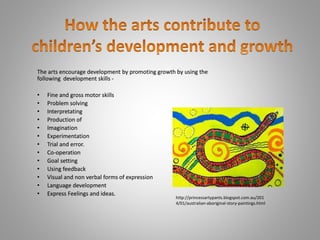Recommended
More Related Content
Viewers also liked
Viewers also liked (9)
Piecas mīlestības valodas Keeping Marriages Together: Latviesu Latvian Language

Piecas mīlestības valodas Keeping Marriages Together: Latviesu Latvian Language
Becoming an Employer of Choice: Mapping the Practices of a Winning Organisation

Becoming an Employer of Choice: Mapping the Practices of a Winning Organisation
Staging systems to feel round the corners of Transition Design

Staging systems to feel round the corners of Transition Design
Super-scaling Magento with Docker, micro-services and micro-costs

Super-scaling Magento with Docker, micro-services and micro-costs
Приоритеты социально-экономического развития Республики Беларусь

Приоритеты социально-экономического развития Республики Беларусь
Similar to Arts Education
Similar to Arts Education (20)
Creating cultures of thinking through teacher language

Creating cultures of thinking through teacher language
Creative-Arts and it's benefits on development.pptx

Creative-Arts and it's benefits on development.pptx
Arts Education
- 1. The arts encourage development by promoting growth by using the following development skills - • Fine and gross motor skills • Problem solving • Interpretating • Production of • Imagination • Experimentation • Trial and error. • Co-operation • Goal setting • Using feedback • Visual and non verbal forms of expression • Language development • Express Feelings and ideas. http://princessartypants.blogspot.com.au/201 4/01/australian-aboriginal-story-paintings.html
- 2. • Use questioning to support children’s thinking. • Allow children to reflect on being the audience and being the performer. • Encourage written reflection – This can organise thoughts. E.g. Journals or reviews. • Review being positive.
- 3. • Children begin to understand how they differ from others, which helps them to develop their identities. • Children may have impairments which will need to be catered for and embraced to have meaningful experiences. • Children we teach will be from a range of backgrounds, teachers should embrace their cultures in order to validate and develop their heritage.
- 4. • Give children opportunities to respond to artworks • Know your children as individuals – What are their backgrounds and interests? • Build awareness and knowledge about the arts. • Build the arts as a culture in your class • Use spiral learning – lay down the knowledge and revisit. • Build the levels of complexity over time. • Learn by DOING. • Use open ended learning structures. http://www.bbc.co.uk/news/entertainment-arts- 23960021
